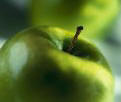|

Antioxidant-Rich Diets Improve Age-Related Declines In Mental
Function Of Rats Tampa, FL (July 15,
2002) — Popeye was right — eat your spinach. In fact, add some fresh-cut
apples to that spinach salad.
Two new animal studies by researchers at the University of
South Florida Center for Aging and Brain Repair and James A. Haley Veterans
Hospital bolster a growing body of evidence that certain fruits and
vegetables may protect the brain against the ravages of age. The
complementary research papers appear in today's issue of the Journal of
Neuroscience.
"If these pre-clinical findings translate to humans, it
suggests that eating a diet high in antioxidant-rich fruits and vegetables
may help reverse declines in learning and memory as you get older," Paula
Bickford, PhD, lead author of both studies and a professor at the USF Center
for Aging and Brain Repair.
In the first study, co-authored by USF's M. Claire
Cartford, PhD, older rats fed a diet rich in spinach for six weeks showed a
reversal in the normal loss of learning that occurs with age. The rats that
ate rat chow containing 2 percent freeze-dried spinach learned to associate
the sound of a bell tone with a subsequent puff of air faster than those fed
regular rat chow, the study found.
The test measured how quickly the rats learned to blink,
after hearing the tone, in anticipation of the oncoming puff of air — a
conditioned response shown to slow with age in rodents and humans.
Spinach is rich in antioxidants, which scientists say can
counteract free radicals generated in the body during normal metabolism and
exposure to environmental insults such as pollution, ultraviolet light and
radiation. An excess of free radicals can damage cellular lipids, protein
and DNA. Studies suggest that a lifelong accumulation of free radicals can
slow mental processes in old age and may be a factor in Alzheimer's and
Parkinson's diseases, Dr. Bickford said.
The second study, co-authored by Carmelina Gemma, PhD, of
USF and James A. Haley VA Hospital, found that the benefit of a diet high in
fruits and vegetables depends on the levels of antioxidant nutrients in the
fruits and vegetables. Furthermore, the researchers suggest, the protective
effect of antioxidants may be linked to their ability to reverse age-related
accumulations of potentially harmful inflammatory substances in the brain.
The USF researchers compared three groups of older rats.
One group ate a diet supplemented by spirulina, a blue-green algae high in
antioxidant activity. The second group was fed a daily ration of apple, a
food moderate in antioxidant activity, with their rat chow. The third group
ate a cucumber-enriched diet, low in antioxidant activity.
Aged rats fed either spirulina-or apple-enriched diets for
two weeks demonstrated improved neuron function, a suppression of
inflammatory substances in the brain, and a decrease in malondialdehyde (MDA),
a marker for oxidative damage. In fact, spirulina reversed the impairment in
adrenergic neural function normally associated with aging. There was no
improvement in rats fed a diet supplemented with cucumber.
"Not all foods are created equal," Dr. Bickford said.
"Cucumbers taste good and have lots of fiber. But unlike spirulina and
apples, they are not rich in phytochemicals that have antioxidant or
anti-inflammatory effects in the brain."
The research has hopeful implications for the prevention
of neurodegenerative disorders in an increasingly aging population, but
still must be tested in humans, Dr. Bickford said.
Until then, the USF neuroscientist recommends that daily
diets include a variety of richly colored fruits and vegetables — the most
colorful ones tend to pack the greatest antioxidant punch. She favors
spinach salads for lunch and routinely snacks on blueberries and
strawberries.
"Studies like these are lending scientific credibility to
what nutritionists, and our mothers, have been telling us for years," Dr.
Bickford said. "Eat your fruits and vegetables. They're good for you!"
Researchers at the University of Colorado Health Sciences
Center and Denver Veterans Affairs Medical Center contributed to the study
on diets enriched with spirulina, apples and cucumbers.
This story has been adapted from a news release issued
by University Of South Florida Health Sciences Center.
(more news) |
